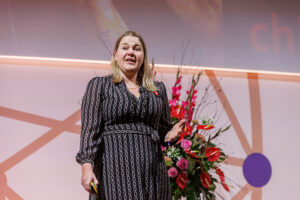KFC has conceded it will no longer meet the 2026 Better Chicken Commitment deadline. The company’s
head of sustainability and head of poultry, Europe, spoke to Chloe Ryan about what happens now
KFC made a bold move when it signed up to the Better Chicken Commitment in 2019. But with a year left before the deadline, the fast food chain has now said it won’t be able to meet all six of the requirements. While it will move to 30kg/sq m stocking density for the chicken it buys from the UK, it will not switch to a slower-growing breed, arguing it is not currently viable.
AMBITION
“We still have the ambition of moving towards the BCC,” says head of sustainability Ruth Edge, speaking to Poultry Business in November at the Egg and Poultry Industry Conference. “It just won’t be in the timelines that are set out in the current commitment.”
One of the main reasons for this is that KFC buys cuts, rather than whole birds, and it is, therefore, reliant on choices made by others in the supply chain. Not enough other companies have signed up to the BCC, so there are not enough slower-growing birds on farms.
“Availability is a massive issue for us. Because retailers en masse haven’t moved towards slower-growing birds, we essentially can’t access it. We will deliver lower stocking density by 2026 for UK and Ireland chicken,” says Edge. “For the rest of our supply we don’t have a timeline at the moment.”
CARBON IMPACT
Another factor is the carbon cost of slower-growing birds. Consumers are increasingly aware that slower-growing birds consume more feed over a longer period of time and are, therefore, worse for the planet. “If you are looking at what has the biggest impact on carbon, it is the slower-growing breed,” says Edge, who adds that it is very difficult to balance the competing demands for better environmental credentials, improved welfare and low cost. With a public commitment to reach net zero on carbon by 2040, this is a major factor.

Celtic Manor Resort
11.11.24
©Steve Pope
Fotowales
PUSH FOR GROWTH
KFC is one of the world’s largest restaurant chains, and opens a new restaurant every two hours somewhere around the world. The chain came to the UK in 1965 and has 1,020 restaurants employing 30,000 people. There is scope in the coming years to open 500 more, the business believes.
KFC sources chicken from Britain and Ire- land, European countries including Poland and Spain, and Thailand and Brazil. Moy Park and 2 Sisters are its suppliers in Britain, and this ac- counts for 55% of the total. About 40% comes from the rest of the Europe and the remaining 5% from further afield.
There is simply not enough of the right cuts to source wholly from Britain, says Nicola Jutsum, head of poultry, Europe. All chicken on the bone is British and Red Tractor assured, as this is the brand’s signature product. “We see that as our hero product,” she says. “It is the colonel’s original product, the iconic product, so adding an additional origin and quality claim is beneficial.”
“We sell by piece rather than weight, and all core products are full muscle. There is nothing chewed and glued. And it is all hand-breaded.”
But there is not enough breast in the UK to meet demand, so this comes from overseas. And to complicate things further, young consumers want breast more than anything else. “Gen Z doesn’t want chicken on the bone – they want breast products,” says Jutsum.

Celtic Manor Resort
11.11.24
©Steve Pope
Fotowales
“We are incredibly passionate that we support British. But it is difficult to get the carcass balance right. We end up balancing other people’s carcasses.”
PLANNING
The difficulty in sourcing adequate supplies from Britain speaks to the wider issue the country and industry is facing – planning laws. As stocking density comes down to 30kg, the supply of chicken is decreasing. This is the case in several other markets in Europe, including the Netherlands and Germany. The only two countries where production is currently growing, says Jutsum, are Poland and Spain, which is why KFC is working with producers there.
The difficulty in getting enough floor space is another factor working against the introduction of slower-growing breeds. “On average, a lower stocking density reduces your flock by 20%, and then for slower-growing breeds it’s 35-40%, so you are significantly reducing your footprint,” says Jutsum.
“Planning and government support are two area where we are struggling and the Budget has heightened that further,” adds Edge.
DIFFICULT BUSINESS ENVIRONMENT
In the recent Autumn Budget, increases in the minimum wage – up to £12.21/hour – and national insurance were announced. This all adds to the difficult trading environment. “We have concerns about the effect on the business,” says Jutsum. “There is only so much we can pass on to customers.
“We’ve also got more obligations coming in relation to waste and recycling,” she adds. “It is coming from every angle. And it does reach a point where we can’t absorb any more costs and yet the product still has to be competitive and appeal to the customer.”
One recent development to try to keep a lid on the price paid by consumers is the introduction of the ‘savers menu’. “It is smaller-format products,” says Edge. “They cost £1.50, £2, £3 – baby-sized versions of the
standard range.”
High-value orders are also doing well. There is growth in orders worth over £50, says Edge, which may be families or groups ordering KFC as a cheaper alternative to going out to a restaurant. “During a recession, quick service restaurants will always win,” says Edge, because it is a “lower-value treat”.

COMPETING CHALLENGES
Of the competing challenges – welfare, sustainability and price – which one is going to win? “That is virtually impossible to say,” says Edge. “To some degree you have to do them all. You might not do all of them 100% to complete gold standard, but to some degree you do have to cover all of those bases.”
She believes “the conversation on welfare has changed slightly when you overlay the carbon and sustainability credentials”, and that more consumers understand there is a carbon cost to pay for slower-growing breeds.
And she adds that where regulation is “driving us on carbon footprint and emissions, I think it forces that conversation.”
BRIGHT FUTURE
Both Edge and Jutsum say they believe in a “bright future” for chicken. But that sense of optimism is some- times tempered by the realities they are facing. On the plus side, poultry is dominating the out-of-home market and
has seen massive growth, says Jutsum. “It is healthier and cheaper, and a lot of other quick-service restaurants are trading into poultry from beef.”
But, on the other hand, companies such as KFC are having to manage a market juggling act. “Quality cannot be compromised on,” says Edge. “At the same time, we need to manage price and drive sales. “We are seeing quick-service restaurant transactions declining,” she adds.
“At the same time, there are increased labour costs and political pressures. We have to decide at what point we can pass those costs on to consumers. The more it costs, the less it sells.”
Consumers – particularly younger generation Z consumers – are very demanding, says Edge. “What do customers want? Everything. They want value, animal welfare, workers’ rights, nutrition and health. Another non-negotiable is taste.”
Essentially, they want companies to handle all of that so they don’t have to. “They want us to remove customer guilt,” she says. “That is why we signed up to the BCC. To remove guilt from customers. We felt like chicken was our only product and we needed to push ourselves in that space. We did that thinking other retailers would also sign up. We still believe in that as a framework and direction of travel. But we cannot deliver it unless other parts of the industry do too.”


